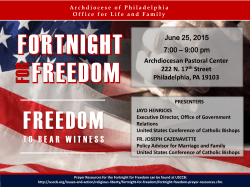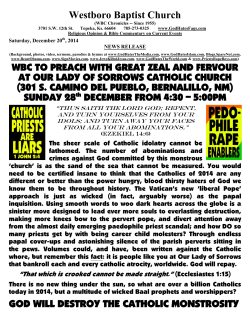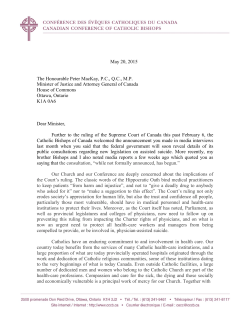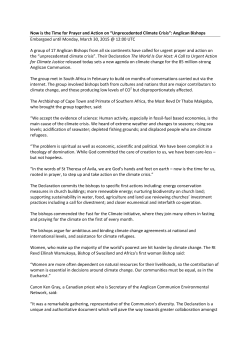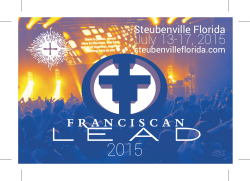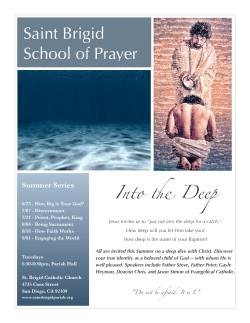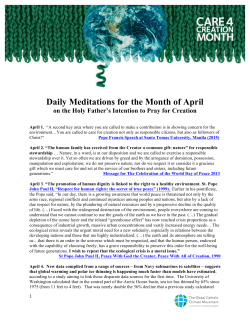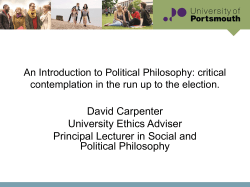
A CALL FOR REFORM IN THE CATHOLIC CHURCH
A CALL FOR REFORM IN THE CATHOLIC CHURCH A Pastoral Letter from Catholics Concerned about Fundamental Renewal of our Church (First printed by Call to Action in the New York Times on Ash Wednesday, 1990, with 4,505 signatures) I n 1990 we celebrate the 25th anniversary of the historic document of the Second Vatican Council, “The Church in the Modern World” (Gaudium et Spes). This document clearly turned the face of the church outward, and defined its agenda as service to the entire human community. It stressed the importance of the laity bringing Christian values to society’s dialogue on pressing issues in the home, the workplace and the political process. Today these issues include: a threatened environment; growing poverty in a world of affluence; a plague of drug abuse reflecting deep despair; scientific advancements confronting us with life decisions without ethical principles to guide us; the need to resolve conflicts within nations, when the temptation to use violence has the potential of destroying our planet. The church should be providing wisdom and encouragement to believers to enter the dialogue on these issues. Unfortunately, today’s church is crippled by its failure to address fundamental justice issues within its own institutional structures. It thus becomes a stumbling block both to its own members and to society. We therefore appeal to the institutional church to reform and renew its structures. We also appeal to all the people of God to witness to the Spirit who lives within us, and to seek ways to serve the vision of God in human society. Our call for reform covers many areas of church life. We see women experiencing oppression, violence and inequality. Yet Vatican II’s “Church in the Modern World” expresses respect for the fundamental rights of every person, and asserts that “every type of discrimination is to be overcome and eradicated as contrary to God’s intent.” We call upon Church officials to incorporate women at all levels of ministry and decision making. We see many Catholics deprived of the church’s sacramental life because of the declining number of priests. In particular, we see Catholics denied regular access to the Eucharist, the center of our worship and spiritual life. We call upon the church to discard the medieval discipline of mandatory priestly celibacy, and to open the priesthood to women and married men, including resigned priests, so that the Eucharist may continue to be the center of the spiritual life of all Catholics. We see very few instances where the people of God are allowed by Church authorities to participate in decisions that affect their lives. Yet in 1970 Karol Wojtyla, now Pope John Paul II, wrote in his book, The Acting Person: “Any authentic community is founded on participation ....(Its structure) is correct only if it admits that practical effectiveness of opposition required by the common good and the right of participation.” We call for extensive consultation with the Catholic people in developing church teaching on human sexuality, just as the U.S. bishops invited particpation in developing their teaching on social justice for the pastoral letters on peace and economic justice. We see the pope and the Roman Curia selecting bishops throughout the world without input from local churches. Yet, as stated in the Cologne Declaration of 1989 supported by hunderds of theologians from many nations, “The procedure of nomination is not some private choice of the Pope's.” We claim our responsibility, as committed laity, religious and clergy, to participate in the selection of our local bishops, a time honored tradition in the church. We see groups marginalized in our church because of race and ethnic identity. We call for church leadership to speed up the enculturation of diverse peoples through new forms of liturgy, language and leadership drawn from the native culture of the people. We see theologians silenced, constructive opposition condemned, loyalty oaths imposed and blind obedience demanded. We call for open dialogue, academic freedom, and due process. We see church officials conducting financial dealings in secret without accountability to the people. We call upon the church to become a model of financial openness on all levels, including the Vatican. We see stalled progress by our church officials toward the reunification of the Christian church, even though countless believers of all denominations have already shared the experience of an ecumenically open church at the local level. We call upon our church officials to abandon their resistance on the remaining differences that separate the churches, and to translate the many results of their ecumenical dialogue commissions into serious concrete plans for reunion. We see the Vatican downgrading the importance of national bishops’ conferences. We affirm in the U.S. the collegial and collaborative leadership style of the National Conference of Catholic Bishops, and call upon the universal church to affirm this traditional and effective exercise of church leadership. We see the pain of countless people at the closing of their parishes and schools throughout the United States. We call for a process that allows all those affected to be heard from, and to take part in these decisions. We see many young adults and children of Catholic families who are reluctant to affiliate with a Church they view as authoritarian and hypocritical. We call for a fundamental change so that young people will see and hear God living in and through the church as a participatory community of believers who practice what they preach. Twenty-five years ago Vatican II clarified the mission of “The Church in the Modern World:” to be a sign of God’s saving work and a servant to the entire human community. The world is wracked by terrible problems–ecological perils, poverty and injustice, conflict and violence. To be a clearer sign and a better servant to God’s global family, our church must reform its own structures. We call on all people within our church, in the spirit of co-discipleship and co-responsibility, to use their imagination and creativity. For the world’s sake, let us make the church more faithful to its mission. Call to Action 2135 W. Roscoe - 1N Chicago, IL 60618 773/404-0004 fax 773/404-1610 cta@cta-usa.org Web: www.cta-usa.org Call To Action: Lay people, religious and clergy working together to foster peace, justice and love in our world, our church, and ourselves, in the spirit of Vatican II and the 1976 Call to Action (U.S.Catholic Bishops’ Bicentennial Conference). 43
© Copyright 2025
